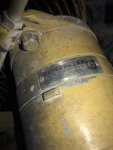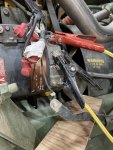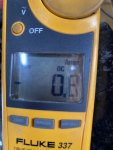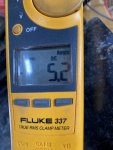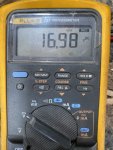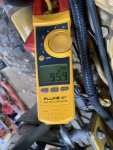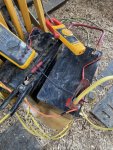Ronmar
Well-known member
- 3,782
- 7,352
- 113
- Location
- Port angeles wa
I think it is looking for the interactions seen in the series string. IE: if it adjusts the 28V it is expecting a comparable movement in the 14v side and vis-versa. or perhaps for a given amount of 28v field drive to reach 28v, it is expecting a certain amount of 14v SCR drive to reach 14V. Say If it sees something like 30% field to get to 28.2V, but only 1% SCR drive to get to 14.1… it may interpret something like this as a series battery or wiring failure.
I looked back and found a discussion where I talked about it(Apr 26 2022). When I disconnected the 14v output on my 100A, the 28V derated to 27V(13.5v per batt), or what I would call a high float voltage for a pair if lead acid wet cells in series. I seem to recall the 14v pulsing, like the reg would re-test the 14/28 relationship every couple of seconds. This is starting to sound familiar… if you had some breakdown on the 14v leg back to the middle of the series batteries well the minimum 14v drive might push you over-voltage without a proper path to the load to absorb it, then the reg faults and derates till the next test, causing the unstable 28v…
did you ever try connecting to an external pair of 12v batteries in series? Disconnect gnd, 14 and 28 at the alt and connect those 3 alt connections to ONLY the standalone series wired batteries? Take all the truck wiring, connections and loads out of the equation? You will probably have to provide 28v from the external batteries to power the excite terminal on the regulator… Then you could apply a test load across the test batts to monitor response and capacity?
Was looking for a neihoff carcas to experiment with a standalone 28 only reg, but havnt come across one yet
I looked back and found a discussion where I talked about it(Apr 26 2022). When I disconnected the 14v output on my 100A, the 28V derated to 27V(13.5v per batt), or what I would call a high float voltage for a pair if lead acid wet cells in series. I seem to recall the 14v pulsing, like the reg would re-test the 14/28 relationship every couple of seconds. This is starting to sound familiar… if you had some breakdown on the 14v leg back to the middle of the series batteries well the minimum 14v drive might push you over-voltage without a proper path to the load to absorb it, then the reg faults and derates till the next test, causing the unstable 28v…
did you ever try connecting to an external pair of 12v batteries in series? Disconnect gnd, 14 and 28 at the alt and connect those 3 alt connections to ONLY the standalone series wired batteries? Take all the truck wiring, connections and loads out of the equation? You will probably have to provide 28v from the external batteries to power the excite terminal on the regulator… Then you could apply a test load across the test batts to monitor response and capacity?
Was looking for a neihoff carcas to experiment with a standalone 28 only reg, but havnt come across one yet
Last edited:




